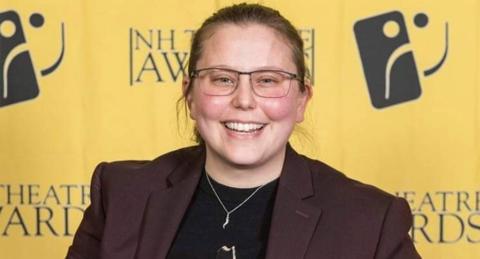
What you are currently doing for work and how did you get to this point?
I am currently the band director at Woodbury Middle School in Salem, NH. My path to music education started when I came to the SYMS (Summer Youth Music Program) here at UNH. I was certain I wanted music to be a part of my life but was unsure if I wanted to pursue it as a degree or as just enjoy it as a leisurely passion. I was performing at a high level at my high school and was excited for the opportunity to challenge myself over the summer at SYMS. Coming to UNH and working with the passionate professors here, seeing the campus and having a positive experience sealed the deal. Once I got to UNH, I became involved in every type of performing ensemble my schedule would allow for (choir, jazz band, symphony orchestra, symphonic band, wind symphony, work study opportunities in the department of theatre and dance) and used those opportunities as a way express myself artistically while adding tools to the tool belt that would one day make me a more well rounded music educator.
How did your education in COLA prepare you for life after college?
This is my sixth year in music education, and in six years I have worked in three different districts with positions ranging form a long-term substitute to a full-time employee when I found my home here in Salem, NH. My teaching responsibilities over that period of time have included: elementary general music, beginning band, elementary chorus, middle school band, middle school chorus, middle school general music, high school band, high school chorus, music theory, jazz band, organizing a ukulele club and coaching drama clubs. Without the course offerings and opportunities available to me in COLA, specifically the Music Department and my work study in the Department of Theatre and Dance, there's no way I would be the musician, artist or educator I am today.
What person or course most influenced you while at UNH?
There were three men that were absolutely instrumental to my success throughout my time at UNH and my success as an artist/educator thereafter: Nic Orovich, Rob Haskins and Andrew Boysen Jr. They were the supportive mentors I needed, nurturing the intrinsic drive I had to give my best while accepting nothing less than an authentic excellence to what they so passionately taught. Nic taught me that it's ok to be human, and that being human is what makes you special. Andy taught me through his presence everyday what it meant to be a truly passionate human, and that living your passion with excellence and pride makes others passionate, too. Rob introduced me to 20th Century music while igniting in me a desire to learn the social/emotional/historical depths of the music/musicians we revere. Rob made the stories behind the music relevant and meaningful with high standards for execution (while graciously allowing me the opportunity to revise when I didn't get it right).
What do you know now that you wish you'd known while at UNH?
In addition to music, I have a real passion for history, philosophy and politics. I would encourage all students (regardless of major) to get out there and try something new! You'll be happy you did and all of those experiences will make you a better, more marketable candidate for employment. A course I took called Making Babies is always a conversation starter when someone looks at my resume.
What advice do you have for students interested in your field?
I am a music teacher, but only 30% of my job is teaching notes and rhythms. The other 70% consists of teaching life skills, lesson planning, copying and completing paperwork, attending meetings for district initiatives, grading and record keeping, providing feedback to students/coworkers, and meeting with students/administrators one-on-one, all with just a 60 minute planning period. I love what I do, but I think there is a gap in understanding as to what the job entails when people go in to a major that involves education. Teaching isn't a math thing, or a history thing or a music thing. It's a human thing. You have to be invested in the humans if you're going to have a successful program and you have to build a community to be a successful educator.